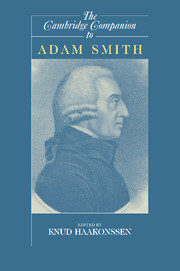Book contents
- Frontmatter
- Introduction: The Coherence of Smith’s Thought
- 1 Imagination: Morals, Science, and Arts
- 2 Adam Smith, Belletrist
- 3 Adam Smith’s Theory of Language
- 4 Smith and Science
- 5 Smith on Ingenuity, Pleasure, and the Imitative Arts
- 6 Sympathy and the Impartial Spectator
- 7 Virtues, Utility, and Rules
- 8 Adam Smith on Justice, Rights, and Law
- 9 Self-Interest and Other Interests
- 10 Adam Smith and History
- 11 Adam Smith’s Politics
- 12 Adam Smith’s Economics
- 13 The Legacy of Adam Smith
- Bibliography
- Index
10 - Adam Smith and History
Published online by Cambridge University Press: 28 August 2006
- Frontmatter
- Introduction: The Coherence of Smith’s Thought
- 1 Imagination: Morals, Science, and Arts
- 2 Adam Smith, Belletrist
- 3 Adam Smith’s Theory of Language
- 4 Smith and Science
- 5 Smith on Ingenuity, Pleasure, and the Imitative Arts
- 6 Sympathy and the Impartial Spectator
- 7 Virtues, Utility, and Rules
- 8 Adam Smith on Justice, Rights, and Law
- 9 Self-Interest and Other Interests
- 10 Adam Smith and History
- 11 Adam Smith’s Politics
- 12 Adam Smith’s Economics
- 13 The Legacy of Adam Smith
- Bibliography
- Index
Summary
Adam Smith was not a historian, in the sense that he wrote nothing that could be described as “a history.” Nevertheless, he thought a great deal about history; he was deeply conscious of the history he was living in; it is probable that he saw the human species as immersed in history at all moments of its existence; and it is certain that he contributed to the development of historical thought in new directions and the acquisition of new meanings by the term “history.” For these reasons, it would be easy for us to describe Smith as a “historian” in all these latter and innovative senses, and to dismiss as archaic and evanescent all the senses in which he is not one. This, however, would be to distort the ways in which the terms “history” and “historian” were used by Smith himself and understood by his contemporaries. Edward Gibbon, who knew him and his work well and looked on him with respect and affection, is the author of two statements which may be taken together as illustrating this point. The first is found in Gibbon’s autobiography and runs:
The candour of Dr Robertson embraced his disciple; a letter from Mr Hume overpaid the labour of ten years; but I have never aspired to a place in the triumvirate of British historians.
The second, probably written earlier, occurs in a late chapter of the Decline and Fall:
On this interesting subject, the progress of society in Europe, a strong ray of philosophic light has broke from Scotland in our own times; and it is with private, as well as public regard that I repeat the names of Hume, Robertson and Adam Smith.
- Type
- Chapter
- Information
- The Cambridge Companion to Adam Smith , pp. 270 - 287Publisher: Cambridge University PressPrint publication year: 2006
- 11
- Cited by



